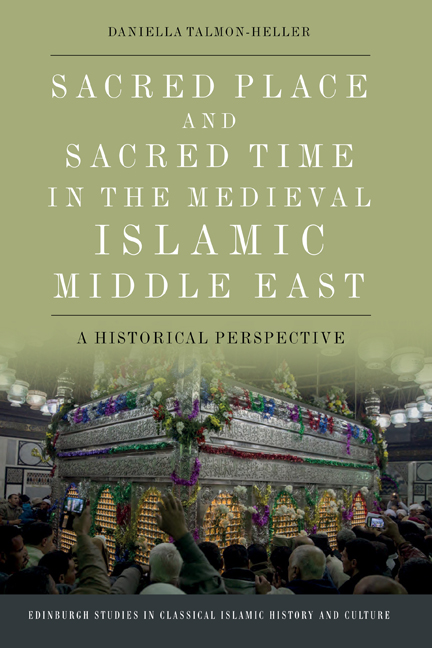Book contents
- Frontmatter
- Contents
- List of Figures
- Acknowledgements
- Map of the Middle East
- Introduction
- 1 Etic Concepts and Emic Terms
- 2 The State of the Art
- Part One A Sacred Place: The Shrine of al-Husayn’s Head
- Part Two A Sacred Time: The Month of Rajab
- Final Comments: Spacial and Temporal Sanctity
- Works Cited
- Index
17 - Rajab under Fatimid Rule
Published online by Cambridge University Press: 17 October 2020
- Frontmatter
- Contents
- List of Figures
- Acknowledgements
- Map of the Middle East
- Introduction
- 1 Etic Concepts and Emic Terms
- 2 The State of the Art
- Part One A Sacred Place: The Shrine of al-Husayn’s Head
- Part Two A Sacred Time: The Month of Rajab
- Final Comments: Spacial and Temporal Sanctity
- Works Cited
- Index
Summary
With the transition to the Fatimid period, we encounter a relative wealth of material on various aspects of religious life and public rituals. Most of it, however, is filtered through later Mamluk pens. Some fragments of the works by the era's historians and its primary documents have survived the destruction of Fatimid libraries and the vicissitudes of time and were incorporated into later compilations. As we have already seen, this literature is further enhanced by the period's travelogues, memoirs, poems and sermons.
Throughout the last decades of the tenth century, the Fatimid Empire and its newly built capital enjoyed great prosperity and cultural vigour. The rule of a living Shiʿi imam, an exceptional occurrence in the history of the downtrodden Shiʿis, generated significant innovations in thought, literature and especially ritual. The royal court was active and quite imaginative with respect to the commemoration of various religious events: pan-Islamic rites such as ʿĪd al-Nahr (Festival of Sacrifice), ʿĪd al-Fiṭr (Breaking of the Fast) and the beginning of the New Year; new Shiʿi-Ismaʿili festivals; and, last but not least, age-old Egyptian Nile rites. On account of the differences in how Ismaʿilis and Sunnis determined the new month, as explained in the excursus above, the pan-Islamic holidays of each stream did not necessarily fall on the same day. However, the royal court found creative solutions that enabled everyone to jointly celebrate the festivals, even the breaking of the fast, without violating any of the two religio-legal codes or the Fatimid etiquette of conduct in the presence of the imam-caliph.
In her Ritual, Politics and the City in Fatimid Cairo (1994), undoubtedly the most important contribution to research on Fatimid political culture, Paula Sanders studies Fatimid protocol in detail and offers a sophisticated analysis of the dynasty's rites. The supremacy of the imam-caliph in the Ismaʿili system assigned him the religious role of God's infallible representative on earth, as well as the political leadership of a wealthy empire. It was manifested, among others, by the central location and vast dimensions of his palace compound, which occupied nearly a fifth of Cairo's total area.
- Type
- Chapter
- Information
- Sacred Place and Sacred Time in the Medieval Islamic Middle EastA Historical Perspective, pp. 154 - 178Publisher: Edinburgh University PressPrint publication year: 2020



